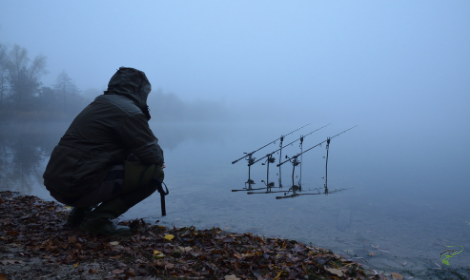
Many anglers have trouble hooking carp in winter. No matter how experienced you are, carp can successfully escape you, especially as the waters get cold and the fish body temperatures fall.
While the chilly nights may seem like the perfect opportunity to show off the carp you caught to your friends and family, the elusive fish can seem impossible to get a hold of.
But how can perfectly healthy fish not take the enticing bait? Well, many anglers suspect this is because carp stop feeding in the winter. The water temperature falls, and as fish are cold-blooded, their body temperature fluctuates with that of the surrounding.
Low body temperatures translate into slow metabolism and less need for nourishment.
If you’re wondering when do carp stop feeding in winter, the answer is they don’t. The good thing is, we will detail in this article all that you need to know for a successful carp fishing trip this winter. So let’s get started!
When do Carp Stop Feeding in Winter?
Although it is a common misconception that carp stop feeding in winters, the truth is they only stop feeding when the weather gets harsher and the water temperatures fall below 39 degrees Fahrenheit (3.88 Celsius). However, anglers have caught carp below 5 degrees and just above 3 degrees, which means carp will not stop feeding in even the peak of winters in most areas.
The frigid environment forces carp to go into torpor, a state of mental and physical inactivity. Torpor is essentially a type of hibernation period, but for carp. During this period, carp will be motionless and inactive, which allows them to conserve energy. Simply put, carp go into torpor to save energy, and being dormant reduces their need to feed as frequently.
However, no matter the time of year, carp will need to feed at least once during twenty-four hours, which means no matter what you hear, catching carp in winter is not impossible.
But how to catch carp when they only come out of their inactive stage once or twice a day? We will tell you all the tips and tricks you need to know to hook this fish successfully in the following paragraphs. So why wait? Let’s begin!
Carp Fishing In Winters
Just like any other sport, carp fishing in winters has its shortcuts. It is unnecessary to cast your line and sit for hours in one spot, waiting for the fish to bite. Instead, you can observe carp behaviour in that area and note its feeding patterns. Once you know when the carp feeds, it is easy to use this knowledge and catch some carp.
Due to lack of energy, carp can be predictable during the winter months. According to experienced anglers, all you need to do is not scare them during their feeding periods, and they will quickly take the bait.
Locations Preferred by Carp in Winter
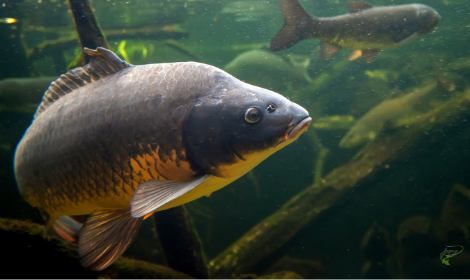
Contrary to popular belief, carp do not spend all their time in deeper or larger bodies of water as their temperatures change slowly. The shallower ponds and lakes warm up quicker, which is more advantageous, and hence more carp will be found there.
However, if the temperature continues to fall to extreme low temperatures and the carp has the option of moving into deeper waters, it will do that as the deeper parts are warmer.
Carp will also be found abundantly in water beds covered by trees or ones with rock formations underneath. The fish seek out areas with silt and natural forage along with shelter and higher temperatures. They don’t have to swim long distances in search of food and get to conserve energy.
Many anglers also prefer to condition the fish into staying at their selected locations. This conditioning is done by regularly baiting the water in the winter months. When carp can find food easily in one place, they wouldn’t want to expend energy to swim far away searching for sustenance, making them an easy target.
Carp Feeding – How To Improve Your Baits
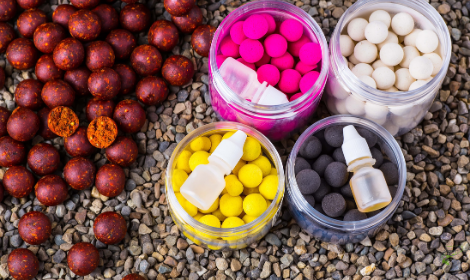
After selecting a suitable location, the next thing is to get the carp feeding. While it may be a little tricky, improving your bait even slightly can lead to a significant increase in carp looking for a meal. When the carp is out of the torpor and actively looking for food, some techniques can work very well and help you catch fish no matter the temperature.
The first and most important thing to do in carp fishing during winters is bait enhancement. The carp are not searching for food as frequently; hence it will mostly bite if the bait is too tempting to resist. You can do bait enhancement by adding some spices and flavours to your regular bait to give the fish some extra incentive to bite.
Some common herbs that have proven to be effective include chilli powder, turmeric, and paprika. It seems like carp prefer their meals with a zing too!
Another thing you can use as bait successfully is maggots. Whether the carp is in torpor or not, ignoring maggots is almost impossible for them. This simple yet juicy meal is irresistible to carp in ponds and lakes, whether shallow or deep.
Not only that, if you are a keen carp angler, you make it even more attractive by adding some extra ingredients and flavours so the potent smell can (hopefully) get the carp flocking to your bait.
Fishing Gear for Winter Carp Fishing
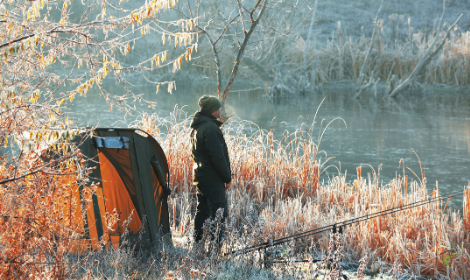
The right fishing gear can make or break your trip. From choosing which bait to use and what tackle will be better to what to wear at your carp fishing trip, the proper fishing gear can help you catch a lot of carp in the right winter conditions.
First of all, since it’s winter, you’ll want to be dressed appropriately for the chilly outdoors. Carp fishing can sometimes mean sitting for long hours and waiting for the carp to come out of their torpor. In the meantime, it is preferable not to freeze yourself. Make sure to wear sufficient layers so you can be comfortable on your trip.
Carp fishing is often most fruitful in the evenings. If you begin during the daytime, your patience will run out by the afternoon when this is the time the carp will start feeding. It is better to start your fishing expedition after 3 pm and spend a few hours with your bait in the water.
When going carp fishing in winters, it is also essential to stick to tried and tested rigs. If you decide to use new tackle, you may not catch any fish as most of the time will be spent getting the hang of the equipment. Most carp prefer to stay in the mid-water zones, which is why a zig-rig will be better suited.
Most anglers also prefer a zig-rig as you can select the length you’ll sit at and even try different depths without having to wait for hours or even days before getting any action!
Tips To Improve Your Carp Fishing Trip In the Winters
After knowing the locations to fish at, what feed and gear to use, and what times to select, you can successfully see when the carp start and stop feeding in winters. However, some additional tips might prove helpful in getting you the best catch of the season. To know what those are, keep reading!
- Prebaiting can significantly improve your chances of catching good carp. For optimum results, start prebaiting the night before (or even a few nights before) in a location where carp can commonly be seen. Some corn mixed with spices can do the trick.
- Even during winters, try to opt for days that are warmer and the sun is shining. The carp will move to shallower parts of water and start feeding.
- Don’t forget to recast. Carp are known to be lazy and lethargic in winter months, and waiting in one spot with your bait cast will not do much good. When you recast, the chance of your bait falling near a hungry carp is much better and this will help you pinpoint where their winter hiding spots are.
That’s All!
Winter is a tough season to catch carp, but not impossible. Many anglers even prefer to go carp fishing in winters for the adventure and thrill that it comes with. While that is true, beginners may face particular challenges in catching carp as they do not know when carp starts and stops feeding in winters.
By keeping an eye on all the different factors such as location, time of day, weather forecast, depth of water, one can easily understand when to go carp fishing.
Additionally, by using the right gear, fishing at the right times and spicing up the bait sufficiently, the carp will have no choice but to bite. Using the tips in this article, you will know when the carp will stop feeding in winters which will be highly beneficial in your overall fishing experience for the season!
So why wait? Grab your tackle box and head to your local water to hook some carp through winter.

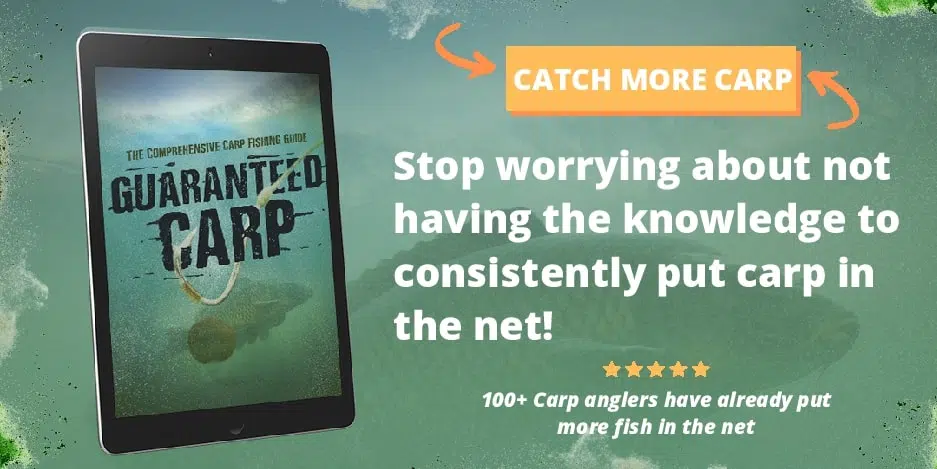
That’s really helpful! Thanks
Thanks Tuo, appreciate the feedback.